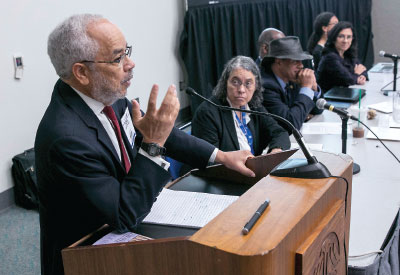Experts Share How They Use Written Word to Influence Black Communities
Abstract
Black authors will describe how the power of the written word and scholarship can improve black communities and make them therapeutic spaces.
Black psychiatrists will share their approaches to using published texts to influence their communities in a Presidential Session titled “Black Psychiatrists and Their Community Commitment” at APA’s Annual Meeting.

This Presidential Session emphasizes renewed and concerted emphasis on the connection of place and health, says Ezra E.H. Griffith, M.D.
“My interest in having received the invitation to set this session up was to give an idea of how black scholar psychiatrists have made contributions of lasting effect on the communities of which we are a part, both the black community and the psychiatric community,” said session moderator Ezra E.H. Griffith, M.D. Griffith is a professor emeritus of psychiatry and African-American studies at Yale School of Medicine in New Haven, Conn.
Griffith added that the session’s common theme is that each presenter has used scholarship “to think about things of interest to black psychiatrists, about how to make things different and better both in the practice of psychiatry and for those receiving our care.”
Billy E. Jones, M.D., M.S., a clinical professor of psychiatry at NYU School of Medicine, former president of the Black Psychiatrists of America, and former commissioner of the New York City Department of Mental Health, will begin the session by discussing his role as a co-editor of Black Mental Health: Patients, Providers, and Systems from APA Publishing. Jones collaborated with Griffith and APA President Altha Stewart, M.D., in creating a volume that includes first-person accounts of black psychiatrists who rose to the top of their fields, delves into the complexities and opportunities for delivering mental health care to subsets of the African-American population, and examines how black mental health professionals are trained and their representation in psychiatry.
Next, Morgan Medlock, M.D., M.Div., M.P.H., director of community outreach and engagement at Howard University Hospital’s Department of Psychiatry in Washington, D.C., will discuss her collaboration with several colleagues to edit Racism and Psychiatry: Contemporary Issues and Interventions. She cowrote a chapter in the book wherein she discusses the role of spirituality and the role of black churches in promoting resilience.
Then, Napoleon Higgins, M.D., CEO of Global Health in the Houston metropolitan area, will discuss how individuals and families within the black community who are affected by mental illness contend with disabilities that compound the mundane struggles against the effects of racism. Higgins is co-editor of Mind Matters: A Resource Guide to Psychiatry for Black Communities, a book that aims to help the public understand that mental illnesses are medical disorders of the mind that are treatable.
The fourth speaker, Carl C. Bell, M.D., president and CEO of the Community Mental Health Council and Foundation in Chicago and a clinical professor emeritus at the University of Illinois at Chicago, will discuss the connection between place and health and how, for the black community, biomedical scholarship should be linked closely to relevant extant community problems. Bell wrote a science-based text, Fetal Alcohol Exposure in the African American Community, that explores ways of combating the deleterious effects of alcoholism, especially in pregnant black women.
Stewart will also speak at the session. Members of the audience will have an opportunity to ask questions at the end of the session. ■
“Black Psychiatrists and Their Community Commitment” will be held Monday, May 20, from 10 a.m. to 11:30 a.m.



